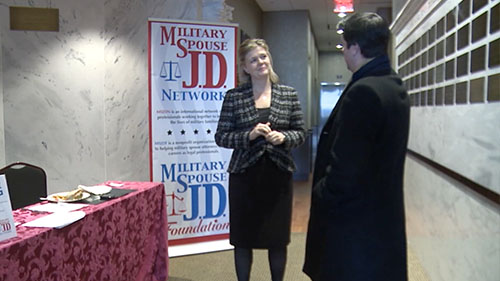Cronkite News has moved to a new home at cronkitenews.azpbs.org. Use this site to search archives from 2011 to May 2015. You can search the new site for current stories.
Bar none: Two Arizona women fight to help lawyers in military families
WASHINGTON – Born and raised in Arizona, fresh out of law school and married, Rachel Winkler said she didn’t worry at first about the rigors of having a spouse in the military.
Until her married life crossed paths with her life as a lawyer.
Passing the bar is tough enough, but lawyers in military families have to face the exam – and the associated fees – every two to three years when the family is relocated.
“It was kind of like, ‘Oh my God, I’m not going to be able to make my career work,’” Winkler said of the sudden realization that military life and law might be a difficult mix.
“How do you find that happy medium when you’re facing these pretty daunting licensing challenges everywhere you go?” she asked.
She found it with Mary Reding, a former Tucson resident and lawyer who also has a husband in the military. Together, the two women are the driving force behind the Military Spouse JD Network, a national association that works to find solutions to the challenges of lawyers who happen to have military spouses.
Founded by Reding three years ago, the network now has nearly 900 members. One of its first successes was in Arizona, where Reding got the state bar association and Supreme Court last year to change the rule on bar admission for military spouses.
Under the revised Rule 38(i), a lawyer with a military spouse could practice law temporarily in Arizona if he or she had already passed the bar in another jurisdiction.
“These people that are serving the country and have no control over where they go, their spouses should have an exception to the rule,” said Rick Erickson, a partner in the Phoenix law firm Snell & Wilmer. He called the new rule “certainly a worthy cause” that “makes a lot of sense.”
Arizona was the second state to adopt such a rule, behind Idaho. Since then, four other states have made the change and 18 more are considering such a proposal.
It’s not a small thing: Reding said “military spouses who are also attorneys face significant issues when they move from state to state.”
“We have to take a new bar exam every two to three years when we move to a new jurisdiction,” she said.
Winkler said a bar exam costs “2 (thousand) or $3,000 a pop.” Not to mention “six months of studying, maybe six months of … waiting for your application to process. And so you lose that time for work.”
When her husband was transferred to Georgia, Winkler stayed behind to take – and pass – the bar exam in Arizona. She took that law license to Washington, D.C., and spent two years shuttling from there to Fort Bragg, N.C., where her husband was stationed next.
She said as a lawyer “it didn’t make sense for me to move” since there was no guarantee her husband would not be relocated again.
“Luckily, I really like my husband,” Winkler said with a laugh. “I made a choice not to live with my spouse for three years … we don’t have children, that was something we could do to make it work.”
But Winkler said living apart from your spouse for years at a time “doesn’t work for everyone and not everyone’s willing to sacrifice that time to make it work.”
Getting a change was not easy, however.
Ward Parker, unauthorized practice of law and special services counsel for the state bar, said Arizona opposed Rule 38(i) at first because “it lacked adequate protection to the public.”
But after Idaho adopted the change in April 2012, Arizona “pretty much adopted the language” of the Idaho rule. The Arizona Supreme Court approved Rule 38(i) in 2012 and it took effect last year.
“It’s fantastic,” Reding said. “We’re really thankful for all the support.”
Rep. Ron Barber, D-Tucson, called Rule 38(i) “the right thing, obviously, because we should be supporting our military families in every way we can.”
Barber said he hopes Reding and Winkler’s work in Arizona will be followed in every state and territory in the nation.
“They really need to be commended for being pioneers, and especially that they’re from Arizona,” Barber said. “I’m really proud of them.”
Reding and Winkler – now president and vice president, respectively, of the network – have expanded their focus from asking for change to creating change-makers: The network is now training members to run for elected office.
“We want them to know that they, too, can seek positions of influence,” Reding said at a training forum in Washington, D.C., this month. “Those positions are so important for the local communities to know about our military lifestyle.”










